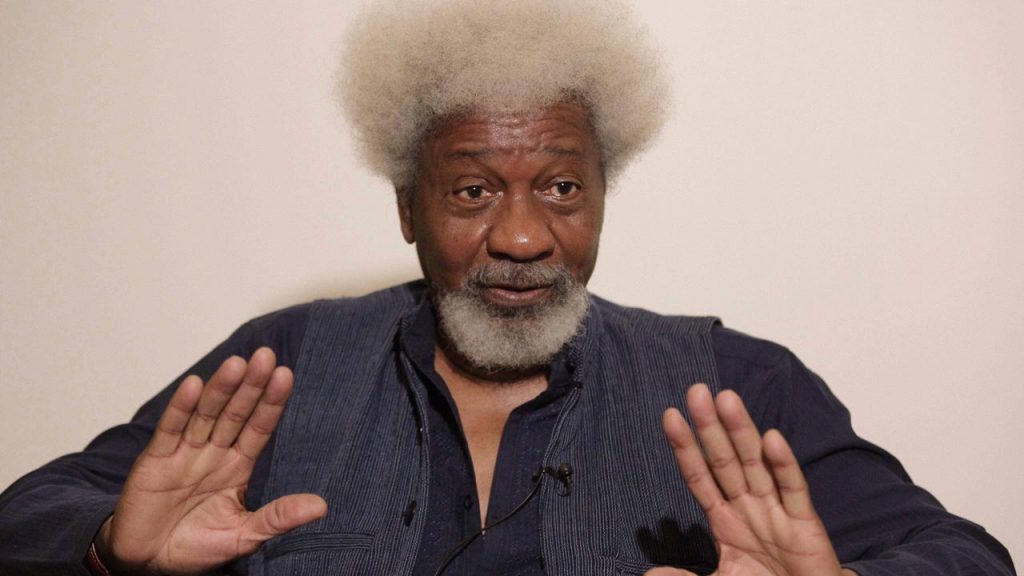Nobel Laureate, Prof. Wole Soyinka, has criticised the Buhari administration for its serial disobedience to court orders, which he described as ‘thuggery’.
Soyinka, in a statement on wednesday, also kicked at the Department of State Services (DSS) for its continued refusal to release Publisher of Saharareporters and Convener of #RevolutionNow, Mr. Omoyele Sowore, despite being granted bail by the Federal High Court, sitting in Abuja.
He dismissed as “childish pretext” the alibi DSS had been proffering to keep Sowore in detention.
The laureate said he could not keep quiet and watch the degradation of the judiciary in which he had formative interest in its health as he was once saved from being sent to life
imprisonment by a judge, who “refused to bow to external pressure in adjudicating a case whose conclusion, had this accused been found guilty as charged, would have been life imprisonment.”
Soyinka was referring to the late Justice Kayode Eso, who in the 60s presided over his trial when in 1965, he was accused of seizing the Western Nigeria Broadcasting Service studio at a gunpoint and broadcast a demand for the cancellation of the Western Nigeria Regional elections.
Soyinka, in the statement titled, “Between Thuggery and State Disobedience,” chronicled the disregard for the judiciary by successive governments and rated the Buhari administration as one of the leading culprits.
He said: “It would be most surprising if my own brush with the law has not crossed my mind since the predicament of Omoyele Sowore, journalist and former presidential candidate began. The Nigerian judiciary was not thereby, nor is today a model of perfection. Nonetheless, exemplars such as Justice Eso have succeeded in creating, in some of us, an exceptional respect for the Bench, instilled a conviction that the law, despite its lapses, demands respect, autonomy and obedience. “Much of the judiciary across the continent remains constantly under siege – Nigeria is no exception. Needless to say, it often strikes me that the “learned brotherhood” could do more to protect, and assert itself.”
According to him, it is surprising that the judiciary, however, has failed to rise up to defend itself from attacks from those he described as “Scofflaws.”
The Nobel Laureate said:”Apart from the obvious and numerous scandals of moral deficit that require constant internal purgation, there are instances where it (judiciary) does fail to protect itself even from putative and/or illegal power.
“Take the assassination of the Minister of Justice and Attorney-General, Bola Ige, on his way to a UN appointment. The presiding judge on that case cried out against unseemly interference from ‘least expected quarters.’ He kept a diary of coded names and times, two pages of which came into my possession. His cries petered out in void. Justice Abass, feeling vulnerable and isolated, bowed out of the case. The judiciary lamely acquiesced, certainly with a huge sigh of relief in some sectors. A robust opportunity lost to burnish the image of the law.”
He also accused the judiciary of doing nothing to defend itself when a former Ekiti State Governor, Mr. Ayodele Fayose, as governor-elect, slapped a judge and allegedly ordered thugs to beat up the jurist.
He said: “I waited to see what would be the response of the judiciary. There came none. Naively, I thought, surely, this institution will rise and defend its very existence through some form of action, even if merely symbolic. Not a squeak. Not even after that governor left office and thereby lost his immunity.
“What to me appeared to be the collapse, not just of a pillar, but of the edifice of human culture, appeared to be no more than a blip on the judicial template.
“There are of course more effective ways of degrading a judiciary than merely brutalizing a judge, and leaving his judicial robes in tatters. One of the most effective, increasingly optimized in Nigeria, is simply by not only ignoring, but treating its orders with disdain, encouraging its agencies to trot out cynical excuses for disobedience while laughing all the way to the citadel of power.
“In that regard, there does appear to be an undeclared contest among succeeding governments, intensified since the return of the nation to civilian government in 1999 for placement in the Guinness Book of Records as the most notorious Scofflaw in the field of democratic pretensions. Or could it be an anticipation of a proposal I made at the Athens Democracy Forum some months ago, calling for an annual award – such as an Order of Demerit – for such an achiever?
“Perhaps we have finally attained maximum saturation, and there is no need for any further record keeping. It is extremely difficult to imagine a further lowering of the bar of disdain for law than we have witnessed under the present regime. The degree of cynicism in the conduct of State Security agencies has attained a level of consistency that is surpassed by only one other previous government – but it is a close call.”
Soyinka attacked the DSS for failing to release Sowore, saying: “Not only does a security agency refuse to obey a court order to release a suspect after fulfilling his bail conditions, that agency manufactures one childish pretext after another, including a claim that no one has shown up to receive the detainee.
“The nation continues to undergo the chagrin of having the rug pulled from under her feet while waiting on the long queue for judicial redress against the strong-arm culture of state, as well as unlisted power interests.”
